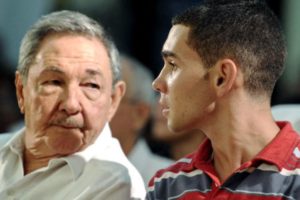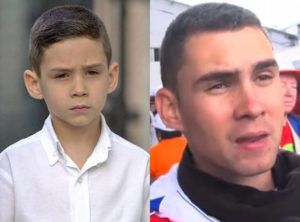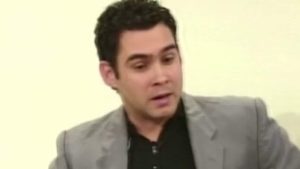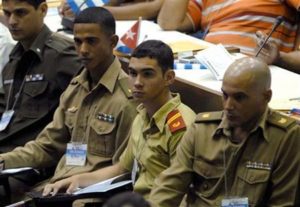ELIÁN GONZÁLEZ: “I am involved with the work of the revolution”.
When little Elian Gonzalez returned to Cuba in 2000 following a poisonous custody battle and a federal raid on his Miami relatives’ home, it was to resume a life far from the glare of the media spotlight. At least that’s what Cuban officials and his father said at the time.
Seventeen years later, it hasn’t worked out that way.
His journey to fame began with the international incident that exploded after 6-year-old Elian was found in the water on Thanksgiving Day 1999. His mother, Elizabeth, and nine other people who were taking part in the clandestine journey drowned after their rickety boat capsized in high seas while they tried to make their way from Cuba to the United States.
Elian’s father, Juan Miguel, fought to bring the boy back to Cuba. Cuban leader Fidel Castro led massive protests on the island demanding Elian’s return.
Elian’s Miami relatives argued if the boy went back to Cuba, he would become a brainwashed trophy for Castro in his long-running feud with the US.
As the two sides fought out the high-profile case in court, U.S. immigration officials decided to put Elian in the custody of his father, who had come to the United States to press for his son’s return.
Elian’s relatives in Miami refused to hand him over, and then, in a nighttime raid, armed federal agents stormed the home of his uncle and seized the boy. An Associated Press photograph of the terrified child, cowering as an officer in riot gear points an assault rifle at him, inflamed passions even more.
Rioting broke out in Miami as many in the Cuban-American community reacted angrily to the seizure of the boy.
Elian was reunited with his father and following more court proceedings — ending with the Supreme Court rejecting the Miami relatives’ efforts to get him back — father and son flew home to Cuba.
The little boy who was found clinging to an inner tube in the Florida Straits, and became famous playing in the yard of his Miami kin’s home while two countries battled over his fate, graduated from a military academy in 2016 with a degree in industrial engineering.
“I saw the monster from the inside”
“I don’t do anything different than other young people,” Gonzalez said in 2015 in an interview with the Cuban Communist Party daily Granma. “I have fun, play sports, but I am also involved with the work of the revolution and realize that young people are essential for the development of the country.”
Before he graduated, Gonzalez told Granma, he plans on joining the Cuban military.
“Living here is a debt I owe to the Cuban people,” Gonzalez said. “That’s who I will always work and fight for.”
“I don’t profess to have any religion, but if I did my God would be Fidel Castro. He is like a ship that knew to take his crew on the right path,” Gonzalez said in an interview with Cuba’s state-run media in 2013.
In another 2013 interview, Gonzalez said he remembers little of the disastrous journey to the US or the tense months living with relatives in Miami’s Little Havana while lawyers and government officials argued over his future.
His mother was “manipulated” by her boyfriend to leave Cuba, he said, and if he had stayed in Miami, he would have been forced to become “a performer” for the media.
“I saw the monster from the inside,” he said, quoting Cuba’s revolutionary poet Jose Marti.
That same year, Gonzalez took his first trip outside of Cuba since his return from the United States, traveling to Ecuador for a youth conference.
During the conference, Gonzalez blasted U.S. policies that he said encouraged Cubans like his mother to make the dangerous journey by sea to Florida.
“Just like her, many others have died attempting to go to the United States. But it’s the US government’s fault,” he told CNN in an interview. “Their unjust embargo provokes an internal and critical economic situation in Cuba.”
Speaking to ABC News in 2015, Gonzalez said he would like to visit the United States again one day to thank the people who supported his return to Cuba.
“To the American people, first I say thank you for the love they give me,” Gonzalez said. “I want the time to give my love to American people.”
But Gonzalez remains a strident revolutionary.
In 2015, he was elected to the leadership of his local Committee for the Defense of the Revolution, the neighborhood watch groups that act as the front-line eyes and ears of the Cuban government. In recent years participation in the committees has dwindled, particularly among the young, who seem less interested in the 59-year-old revolution than their parents and grandparents are.
“It’s a mistake to say that young people are ‘lost,'” Gonzalez said in the interview with Granma in June. “Young people aren’t the future, we are the present.”
When Fidel Castro died on November 25, 2016 — the 17th anniversary of Elian’s rescue at sea — once again Gonzalez was front and center to take part in the official mourning. Gonzalez’s voice cracked as he talked about Castro on state-run television. “He was like a father,” he said. “I wanted to show him what I had achieved so he would be proud of me.”
Gonzalez remains one of the most identifiable figures on the island and one of his generation’s most outspoken supporters of the Cuban Revolution.
ELIÁN GONZÁLEZ: “Estoy involucrado en el trabajo de la revolución”.
Cuando el pequeño Elián González volvió a Cuba en el 2000 después de una batalla de custodia venenosa y una incursión federal en la casa de sus familiares de Miami, fue para reanudar una vida lejos del fulgor de los medios de comunicación. Al menos eso es lo que dijeron los funcionarios cubanos y su padre en ese momento.
Diecisiete años más tarde, no ha funcionado de esa manera.
Su viaje a la fama comenzó con el incidente internacional que estalló después de que Elian, de 6 años de edad, fue encontrado en el agua el Día de Acción de Gracias 1999. Su madre, Elizabeth y otras nueve personas que participaron en el viaje clandestino se ahogaron después de su destartalado barco Volcó en alta mar mientras trataban de hacer su camino desde Cuba a los Estados Unidos.
El padre de Elián, Juan Miguel, luchó por llevar al niño de regreso a Cuba. El líder cubano Fidel Castro dirigió protestas masivas en la isla exigiendo el regreso de Elián.
Los familiares de Elian en Miami argumentaron que si el chico volvía a Cuba, se convertiría en un trofeo lavado por el cerebro de Castro en su pelea de larga data con Estados Unidos.
Mientras las dos partes luchaban contra el caso de alto perfil en la corte, los funcionarios de inmigración estadounidenses decidieron poner a Elián bajo la custodia de su padre, que había venido a Estados Unidos para presionar por el regreso de su hijo.
Los familiares de Elián en Miami se negaron a entregarlo, y luego, en una redada nocturna, agentes federales armados irrumpieron en la casa de su tío y se apoderaron del niño. Una fotografía de Associated Press del niño aterrorizado, encogiéndose como un oficial en el engranaje antidisturbios apunta un rifle de asalto en él, inflamado pasiones aún más.
Los disturbios estallaron en Miami ya que muchos en la comunidad cubano-americana reaccionaron con enojo ante la toma del niño.
Elian se reunió con su padre y después de más procedimientos judiciales – terminando con la Corte Suprema rechazando los esfuerzos de los familiares de Miami para conseguirlo de nuevo – padre e hijo volaron a casa a Cuba.
El niño que se encontró aferrado a un tubo interior en el Estrecho de la Florida, y se hizo famoso jugando en el patio de la casa de su familia de Miami mientras dos países lucharon por su destino, se graduó de una academia militar en 2016 con un título en ingeniería industrial.
“Vi al monstruo desde adentro”
“No hago nada diferente de otros jóvenes”, dijo González en una entrevista con el diario comunista cubano Granma. “Me divierto, hago deportes, pero también estoy involucrado en el trabajo de la revolución y me doy cuenta de que los jóvenes son esenciales para el desarrollo del país”.
Antes de graduarse, González dijo a Granma, planea unirse al ejército cubano.
“Vivir aquí es una deuda que debo al pueblo cubano”, dijo González. “Es por eso que siempre voy a trabajar y luchar”.
“No profeso tener ninguna religión, pero si lo hiciera mi Dios sería Fidel Castro, es como un barco que sabía llevar a su tripulación en el camino correcto”, dijo González en una entrevista con la prensa estatal de Cuba en 2013.
En otra entrevista de 2013, González dijo que recuerda poco del desastroso viaje a Estados Unidos o de los meses tensos que vivían con familiares en la Pequeña Habana de Miami, mientras abogados y funcionarios gubernamentales discutieron sobre su futuro.
Su madre fue “manipulada” por su novio para salir de Cuba, dijo, y si se hubiera quedado en Miami, se habría visto obligado a convertirse en “un intérprete” de los medios de comunicación.
“Vi al monstruo desde adentro”, dijo, citando al poeta revolucionario cubano José Martí.
Ese mismo año, González tomó su primer viaje fuera de Cuba desde su regreso de Estados Unidos, viajando a Ecuador para una conferencia de jóvenes.
Durante la conferencia, González criticó las políticas estadounidenses que, según él, animaban a los cubanos, como su madre, a realizar el peligroso viaje por mar a Florida.
“Al igual que ella, muchos otros han muerto intentando ir a Estados Unidos, pero es culpa del gobierno de Estados Unidos”, dijo a CNN en una entrevista. “Su injusto embargo provoca una situación económica interna y crítica en Cuba”.
En declaraciones a ABC News en 2015, González dijo que le gustaría volver a visitar Estados Unidos un día para agradecer a las personas que apoyaron su regreso a Cuba.
“Para el pueblo estadounidense, primero digo gracias por el amor que me dan”, dijo González. “Quiero el tiempo para dar mi amor a la gente americana.”
Pero González sigue siendo un revolucionario estridente.
En 2015, fue elegido al frente de su Comité local para la Defensa de la Revolución, los grupos de vigilancia vecinales que actúan como los ojos y oídos de primera línea del gobierno cubano. En los últimos años la participación en los comités ha disminuido, particularmente entre los jóvenes, que parecen menos interesados en la revolución de 59 años que sus padres y abuelos.
“Es un error decir que los jóvenes están ‘perdidos'”, dijo González en la entrevista con Granma en junio. “Los jóvenes no son el futuro, somos el presente”.
Cuando Fidel Castro murió el 25 de noviembre de 2016 -el 17 aniversario del rescate de Elián en el mar- González fue nuevamente el centro y el centro para participar en el luto oficial. La voz de González se quebró mientras hablaba de Castro en la televisión estatal. “Era como un padre”, dijo. “Quería mostrarle lo que había logrado para estar orgulloso de mí”.
González sigue siendo una de las figuras más identificables de la isla y uno de los partidarios más abiertos de su generación de la Revolución Cubana.
 Patrick Oppmann, CNN reporting.
Patrick Oppmann, CNN reporting.
Agencies/CNN/Excerpts/Internet Photos/ YouTube/ Arnoldo Varona/ TheCubanHistory.com
THE CUBAN HISTORY, HOLLYWOOD.












